
Five Zero Shopping Days Left (And Room For Ten Books!)
By R. Alan Clanton | published Friday, December 20, 2013 |
Thursday Review Editor
I can be an incorrigible thief around the holidays. No, I don’t steal freshly baked chocolate chip cookies from under the tree and then guzzle that cold glass of milk. No, I don’t swipe shiny red and green bows from your nicely-wrapped packages and move them to mine. No, I did not steal your credit card information from Target.
What I do is much worse. When desperate, I steal other people’s gift ideas at Christmas.
So when frequent Thursday Review writer and contributor Kristy Webster submitted an article yesterday titled “The 12 Books of Christmas,” I immediately placed the review on our Front Page and said to myself dang, why didn’t I think of that? No problem. I’ll use a different tack for the same theme—and I’ll roll out my own list of the 10 must-have non-fiction books of the year. Each would make a great gift for the person on your Santa list who loves history, biography, politics, technology, social studies or culture.
So, in no particular order, here are ten printed gift ideas for those voracious readers of doorstop-sized non-fiction (remember, that’s only two books per day starting today!):
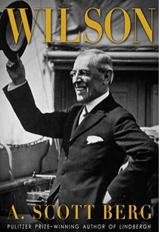 Wilson;
Wilson; A. Scott Berg
This massive, sprawling biography reads with the reliable grace and majesty of Berg’s other great biographies, including Lindbergh and Max Perkins: Editor of Genius. Berg looks at the dramatic times in which Woodrow Wilson governed, and his successes (U.S. intervention in World War I) and his failures (the League of Nations). At $40, the book is a bit pricey, but shop carefully online—especially at Amazon—and you can find mint copies for as little as $20. My copy just arrived last week, and we plan to review it here in January 2014.
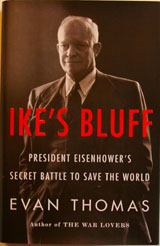 Ike’s Bluff: President Eisenhower’s Secret Battle to Save the World; Evan Thomas
Ike’s Bluff: President Eisenhower’s Secret Battle to Save the World; Evan ThomasReviewed here earlier this year, Ike’s Bluff is a masterfully written look at the sometime tense, behind-the-scenes struggle Eisenhower faced as President in the shifting and rapidly-changing period after World War II, a time when the development and proliferation of atomic weapons ushered in an era of certain destruction if the superpowers miscalculated. Highly readable history.
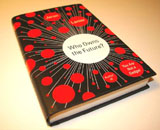 Who Owns the Future?; Jaron Lanier
Who Owns the Future?; Jaron LanierAn eloquent but blunt look at how technology may be rapidly taking away individualism and freewill, and replacing it instead with algorithms and templates for human behavior. The internet was supposed to usher in unbounded freedom and limitless possibility, but Lanier shows us how easily it has been channeled away from the middle and lower classes to create a new cadre of super-billionaires., al the while eliminating jobs. Lanier offers an economic path back, a world in which computers need not take away our earning power as individuals, nor our creativity.
 Green Illusions:
Green Illusions:The Dirty Secrets of Clean Energy and the Future of Environmentalism; Ozzie Zehner
A fast, easy read which takes to task—or takes to the woodshed—many of the myths and shibboleths of alternative energy, as well as the core reasons so much of world does not climb on board with clean energy as a global solution. In addition to dismissing sloppy science, Zehner also looks more closely at consumption, inequality and the inevitable side-effects wrought by a rising global economy. This is a good book for both the Green in your family, as well as the energy hawk.
 Immigration Wars: Forging an American Solution; Jeb Bush & Clint Bolick
Immigration Wars: Forging an American Solution; Jeb Bush & Clint BolickBush and Bolick attempt—with fair success—to untangle the sometimes emotional issue of immigration, pointing out accurately that the GOP’s 2012 losses at the polls were at least partly the result of harsh, sometimes strident positions on immigration, homeland security and the borders (especially the border with Mexico). Bush and Bolick see immigration as an economic issue, one which Americans must resolve quickly and intelligently if the U.S. is to remain competitive in a dynamic global marketplace. This book is a joy to read and can be consumed in one sitting—perfect for the adult with attention deficit issues who nevertheless likes to spout political opinion.
 The Center Holds: Obama and His Enemies; Jonathan Alter
The Center Holds: Obama and His Enemies; Jonathan AlterAlter, a gifted reporter and established mainstream writer, tackles the thorny and contentious terrain along the red blue divide, and discusses how Barack Obama managed to outflank a well-funded GOP in 2012, while also outmaneuvering the forces of conservative media. Alter sees Obama’s victory not as a compelling return to liberalism or progressive movement, but simply an example of an American embrace of the vital center. Perhaps not for TR’s more conservative readers who might, from time to time, feel their blood boil. But as balanced a look the new demographic dynamic at work in the Electoral College as anything I’ve seen. (To be reviewed in these pages in February 2014.)
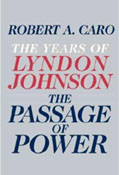 The Passage of Power: The Years of Lyndon Johnson; Robert Caro
The Passage of Power: The Years of Lyndon Johnson; Robert CaroThis fourth book in Caro’s great (eventual) five-part series is a magisterial look at the Lyndon Johnson’s ascendancy to the presidency through, first, his epic intra-party battle with the young John F. Kennedy, and, then, his sudden thrust into the Oval Office after JFK’s assassination in Dallas in 1963. Caro’s research and thoroughness is sprawling in this massive volume, and at the core of this story is the start of a famously deep divide within the Democratic Party. Enjoyable and illuminating from start-to-finish, and an especially great gift for a family member or friend who loves twentieth century history or politics. The book is priced at $35, but careful shopping online can yield mint copies for as little as $18.00.
 To Save Everything, Click Here; Evgeny Morozov
To Save Everything, Click Here; Evgeny MorozovExcellent reading for anyone who loves the paradox of technology, for Morozov takes to task many of the myths surrounding the internet and the digitization of information (a companion piece, of sorts, to Lanier's book mentioned above). Morozov challenges readers to rethink the notion of technology as the ultimate solution to global problems. Reads smoothly and quickly despite its formidable 350-plus pages. Give this to the obsessive techno-geek in your family, or to that friend who thinks that every problem can be solved with a search engine requests and a click of the mouse.
 Fighting for the Press: The Inside Story of the Pentagon Papers and Other Battles; James C. Goodale
Fighting for the Press: The Inside Story of the Pentagon Papers and Other Battles; James C. GoodaleOne of the most enlightening reads I have encountered in years. Goodale’s book can be consumed in days (hours even, depending on how fast you read) once you’ve been hooked by the rapidly-moving story. Goodale takes us through the dramatic high-stakes battle between the administration of Richard Nixon and the New York Times (for which Goodale was a legal counsel) in the days and weeks after The Times came into possession of thousands of pages of top secret documents about U.S. military involvement in Vietnam, a trove of material which became known as The Pentagon Papers. The Times victory in the Supreme Court was a great win for freedom of the the press, but in the final chapters, Goodale concludes that the pendulum is in full swing again as we are rapidly losing our ability to report the honest, unvarnished truth.
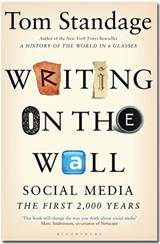 Writing on the Wall: Social Media, the First 2000 Years; Tom Standage
Writing on the Wall: Social Media, the First 2000 Years; Tom StandageStandage takes on the long and complex history of social media, i.e., all media is social media. (We plan to review this book here in late January 2014). Standage traces humanity's constant desire to socialize, interact and network. Julius Caesar invented what was one of the earliest known newspapers, and even encouraged his citizens to share his news with their neighbors, friends and business partners, in what amounted to a complex, viral system of dissemination. Fun, enlightening reading, and helps us to understand how our rapidly-evolving media technologies are just the latest in a series of social advancements.
